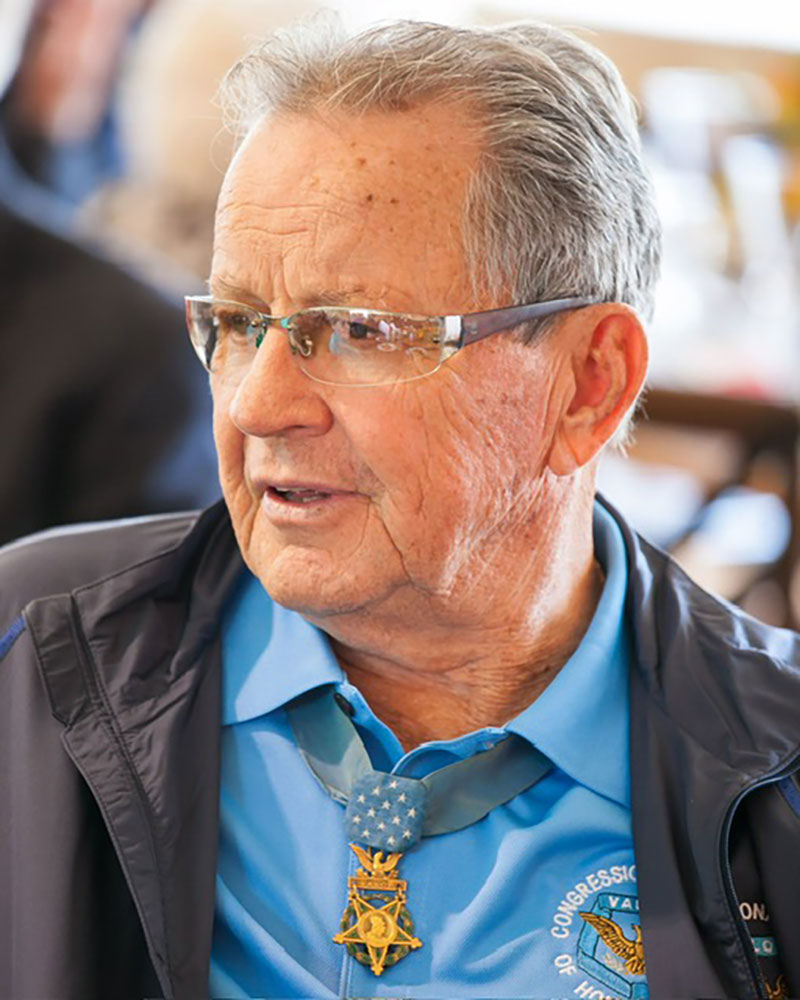The Dust Off Patriotism of Patrick Grady

On December 24, 2023, the Atlanta Vietnam Veterans Business Association (AVVBA) released a 47-minute video, entitled The Truths and Myths of the Vietnam War. The video is introduced by Academy Award-nominated actor Sam Elliot. The first section of the video beginning at about one minute and 14 seconds and lasting a little over a minute features retired Army Major General Patrick Henry Grady, a Vietnam Medal of Honor recipient, explaining the significance of the Vietnam War and the importance of understanding it on a factual and truthful basis. In a later portion of the video, beginning at 9 minutes and 10 seconds , he narrates many of the tremendous and unprecedented humanitarian accomplishments of the American military in Vietnam, but which were largely ignored by the media. He has often said that “humanitarianism was our great victory in that war.”
Probably, not many people recognize just how significant Major General Patrick Grady is as an example of American courage and dedicated patriotism. Every Medal of Honor citation I have read exhibits extraordinary levels of courage and sacrificial dedication to patriotic duty and honor. These are often motivated and expressed in unbreakable loyalty to comrades and humane sympathy for the victims of war.
“Dust Off” was the original radio call sign of aeromedical helicopter evacuation units in Vietnam. As an Army “Dust Off” helicopter pilot dedicated to rescuing wounded or desperately endangered soldiers and civilians from extremely dangerous, active battle zones, Grady was responsible for rescuing over 5,000 people whose lives were in immediate jeopardy from wounds, enemy fire, or capture. Thus in sheer numbers of successful rescues under very dangerous conditions, Grady should stand out as one of America’s greatest military heroes. But that has never matched the agenda of the liberal American media.
Grady now at age 87, is still healthy, articulate, and active. He is one of only about 60 surviving Medal of Honor recipients. Grady is the only one who received both the Medal of Honor and the Army Distinguished Service Cross. He also received the Distinguished Flying Cross (6), many Air Medals (52), the Broze Star with Valor (2), and the Purple Heart. He flew over 2,000 combat missions in two one-year tours of Vietnam duty, 1964-1965 and 1967-1968. He has to be one of the most skilled and innovative helicopter pilots in history, and he developed these innovations and skills in his dedication to rescuing wounded soldiers in extremely hazardous weather and combat conditions.
Knowing something about Patrick Henry Grady is important to understanding the Vietnam War, but it is even more important to remembering and understanding the nobler aspects of the American character, which we need to be encouraging and preserving rather than erasing.
Grady was born in 1936 in Philip, South Dakota, and graduated from O’Dea High School in Seattle Washington. O’Dea was an all-boys Catholic school run by the Congregation of Christian Brothers. He graduated from Seattle University in 1959 and received an Army commission through ROTC as a second lieutenant in the Army Medical Service Corps. After being stationed in West Berlin, he attended Army Aviation School in Alabama in 1963 and was deployed to Vietnam In 1964. Below are the Army citations for his 1968 Medal of Honor and 1967 Distinguished Service Cross.
Major Patrick Henry Grady, Medal of Honor Citation, 6 January 1968
U.S. Army, Medical Service Corps, 54th Medical Detachment, 67th Medical Group, 44th Medical Brigade. Near Chu Lai, Republic of Vietnam, January 6, 1968.
For conspicuous gallantry and intrepidity in action at the risk of his life above and beyond the call of duty, Major Grady distinguished himself while serving in the Republic of Vietnam commanding a UH-1H ambulance helicopter, volunteered to rescue wounded men from a site in enemy held territory which was reported to be heavily defended and to be blanketed by fog. To reach the site he descended through heavy fog and smoke and hovered slowly along a valley trail, turning his ship sideward to blow away the fog with the backwash from his rotor blades. Despite the unchallenged, close-range enemy fire, he found the dangerously small site, where he successfully landed and evacuated 2 badly wounded South Vietnamese soldiers. He was then called to another area completely covered by dense fog where American casualties lay only 50 meters from the enemy. Two aircraft had previously been shot down and others had made unsuccessful attempts to reach this site earlier in the day. With unmatched skill and extraordinary courage, Major Grady made 4 flights to this embattled landing zone and successfully rescued all the wounded. On his third mission of the day Maj. Grady once again landed at a site surrounded by the enemy. The friendly ground force, pinned down by enemy fire, had been unable to reach and secure the landing zone. Although his aircraft had been badly damaged and his controls partially shot away during his initial entry into this area, he returned minutes later and rescued the remaining injured. Shortly thereafter, obtaining a replacement aircraft, Major Grady was requested to land in an enemy minefield where a platoon of American soldiers was trapped. A mine detonated near his helicopter, wounding 2 crew members and damaging his ship. In spite of this, he managed to fly 6 severely injured patients to medical aid. Throughout that day Maj. Grady utilized 3 helicopters to evacuate a total of 51 seriously wounded men, many of whom would have perished without prompt medical treatment. Major Grady’s bravery was in the highest traditions of the military service and reflects great credit upon himself and the U.S. Army.
In a later interview, Grady stated that the three helicopters he used in these actions accumulated over 400 bullet and shrapnel holes.
Major Patrick Henry Grady, Distinguished Service Cross citation, 2 and 3 October 1967
The President of the United States of America, authorized by Act of Congress, July 9, 1918 (amended by act of July 25, 1963), takes pleasure in presenting the Distinguished Service Cross to Major (Medical Service Corps) Patrick Henry Grady (ASN: 0-88015), United States Army, for extraordinary heroism in connection with military operations involving conflict with an armed hostile force in the Republic of Vietnam, while serving with 54th Medical Detachment (Helicopter Ambulance), 74th Medical Battalion, 67th Medical Group, 44th Medical Brigade. Major Grady distinguished himself by exceptionally valorous actions on 2 and 3 October 1967 as pilot of an ambulance helicopter on a rescue mission near Tam Ky. A friendly force requested extraction of several seriously wounded soldiers from a mountainous jungle landing zone. Major Grady volunteered to attempt the rescue although heavy storms had grounded numerous aircraft in the area. Flying by instruments and radar, he arrived in the area of engagement and began a vertical descent into the tight landing zone by the light of flares. Unable to see more than a few feet outside his aircraft, he skillfully maneuvered to the friendly forces, loaded his ship to capacity and quickly flew to the hospital. The storm increased in intensity and made flying extremely hazardous, but he returned to the pickup site and once more attempted to land. As he approached the area, enemy forces directed devastating machine gun and automatic weapons fire at him. Completely disregarding his personal welfare, he flew low over the area for forty-five minutes before he located the friendly forces. Guiding himself by the flashes of the enemy weapons, he flew into the landing zone through a curtain of fire and loaded eight patients. He quickly flew the patients to the hospital, and once more returned to pick up the remaining casualties and carry them to safety. His fearless actions were responsible for the rapid and successful evacuation of several wounded fellow soldiers. Major Grady's extraordinary heroism and devotion to duty were in keeping with the highest traditions of the military service and reflect great credit upon himself, his unit, and the United States Army.
Grady also recited the tremendous U. S. loss of helicopters in the war. Of the 12,000 helicopters used in the war, over 5,600 were lost. Casualty evacuation was also significantly more dangerous than experienced by combat and transport helicopter missions.
Following the end of his 1968 Vietnam experience, Grady worked his way through the ranks of Army Aviation, special assignments, and public relations and retired as a Major General in 1993. He has been actively engaged in patriotic organizations since his retirement. He is also a member of the Sons of the American Revolution. He was inducted into the Aviation Hall of Fame in 2013.
There are a number of short interviews of Grady that reveal his reflections on defining courage and patriotism. An American Legion video of about ten years ago was most precise. First of all, he considers courage to be closely linked to Faith, surely in his own case, but in most others as well. He says that in all his harrowing flights, he was praying, but not praying because of fear, but that he could find a way to accomplish his often difficult rescue missions. A rough quote: “Where does the courage come from—it comes from Faith.” He defines Faith in basic traditional Christian terms, emphasizing the goodness, wisdom, presence, and ultimate sovereignty of God in everything.
He also believes that real courage is usually accompanied by “goodness,” and that goodness comes from God. [Classical Greek education concentrated on three principles: Truth, Beauty, and Goodness. Goodness was best defined as “being in harmony with God and his creation.”] I believe what Grady means by goodness is close to being in harmony with God and His creation. He warns that athletes and celebrities should not be considered heroes unless they also show this quality of God-given goodness.
He believes also that courage, goodness, and the willingness to sacrifice for others or a right cause are closely related. It is better to look to ordinary people—moms, dads, teachers, honest working people and civil servants--who have qualities of goodness and courage rather than following famous athletes and celebrities, who often do not have these qualities.
Grady says that patriotism is much more than just loving your country. If you are not willing to support and defend your country, you are not a patriot. You simply enjoy some good things about your country but do not fully consider their origin and costs. Patriotism requires the kind of love that is willing to sacrifice for others. Courage, even in battle, is often linked to sacrificial love. Grady believes that courage is available to everyone without limit no matter their abilities or standing. He also mentions that courage can sometimes be measured by withstanding hardship or pain just a little longer.
An astonishing number of Medal of Honor stories and POW survival stories reflect the importance of Faith.
“Courage is not simply one of the virtues but the form of every virtue at the testing point…”—C. S. Lewis









 Mike Scruggs is the author of two books: The Un-Civil War: Shattering the Historical Myths; and Lessons from the Vietnam War: Truths the Media Never Told You, and over 600 articles on military history, national security, intelligent design, genealogical genetics, immigration, current political affairs, Islam, and the Middle East.
Mike Scruggs is the author of two books: The Un-Civil War: Shattering the Historical Myths; and Lessons from the Vietnam War: Truths the Media Never Told You, and over 600 articles on military history, national security, intelligent design, genealogical genetics, immigration, current political affairs, Islam, and the Middle East. 


